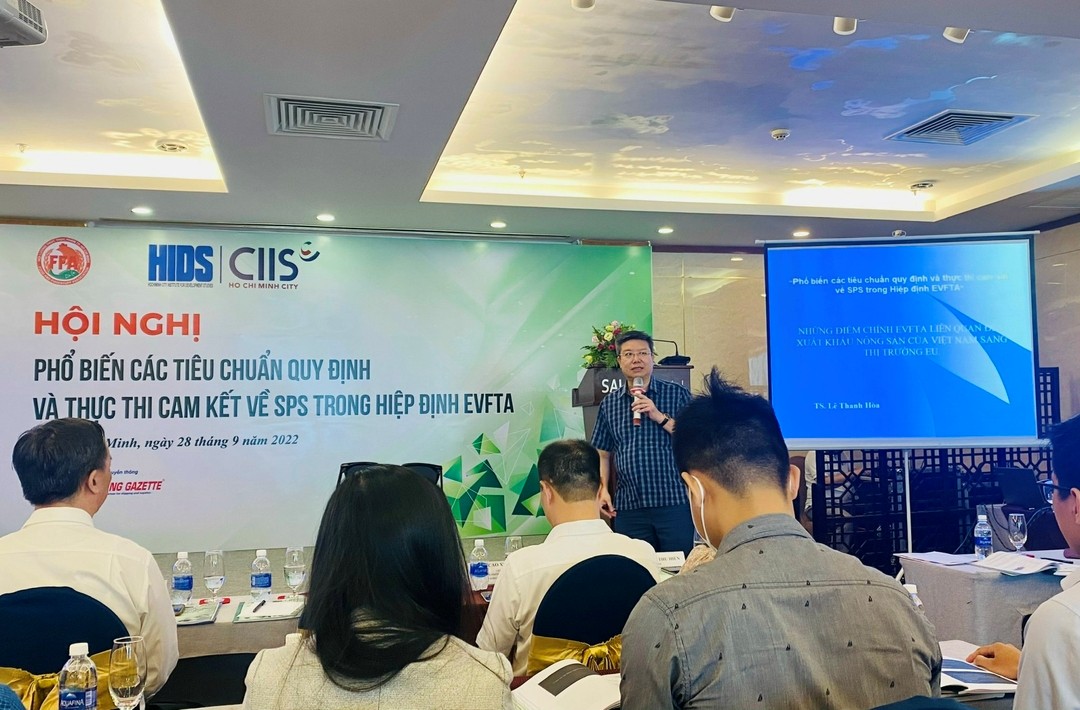- Giới thiệu
- Nhóm Công tác
- Tin tức
- Thông tin về FTA
- Tài Liệu
- Sự kiện
- Liên hệ
Enhancing dissemination and updating of information about SPS to effectively utilize EVFTA
Dr. Le Thanh Hoa, Director of SPS Vietnam shared on the problems facing businesses when exporting to the EU at the workshop on September 28.

Dr. Le Thanh Hoa, Director of SPS Vietnam Office giving a speech at the workshop.
At the Workshop on disseminating regulatory standards and implementing SPS commitments under the EVFTA, Dr. Le Thanh Hoa, Director of SPS Vietnam Office, recommended the Ministry of Agriculture and Rural Development to promptly issue a plan to implement Vietnam's commitments on Sanitary and Phytosanitary Measures (also known as SPS) immediately after the EVFTA came into effect in August 2020.
"The main groups of activities of interest are the dissemination and update of information regarding SPS within the framework of the EVFTA. Additionally, we need to accelerate the review of policy mechanisms as well as the strengthening of food safety and quality management in compliance with EU regulations" said Mr. Hoa.
As a considerably difficult market to access, the EU pays special attention to the regulations on the risk of microbial and chemical contamination for vegetables and fruits exported to the EU. Risks of unsafe aquatic products with regards to residues of banned antibiotics, parasiticides, residues of aquatic toxins, heavy metals, seafood processing additives, microbial contamination among many others are also of great interest to this fastidious market.
For manufacturers and exporters, the EU requires businesses to qualify for various food safety certification systems including the ISO 22000 or HACCP; food safety and quality standards, quality inspection and supervision, regulations on traceability for raw materials, finished products and distribution, product recall if necessary and so on.
Consequently, Director Le Thanh Hoa recommended domestic businesses to train and improve capacity for managers, technicians, producers and processing units. In addition, businesses must have an investment strategy in order to build cultivation areas and cooperate with producers to establish production processes that can strictly meet the food safety requirements; they must also have a plan to monitor hazards throughout the entire production process, with special focus on microbial hazards and pesticide residues.
"The monitoring programs are not limited to the production and processing of products but also the labor and environmental issues. In the future, other markets are likely to impose similar or stricter requirements. Therefore, meeting these regulations promptly will help products from exporting businesses reach any market in the world", Mr. Hoa emphasized.
After 2 years of implementing the EVFTA Agreement, Vietnam's export turnover to the EU market reached nearly 83 billion USD, which is an increase of approximately 15%. Namely, the two-way trade turnover between Vietnam and the EU reached more than 57 billion USD in 2021, an increase of 14.5% over the same period in 2020.
Most notably, Vietnam exported over 40 billion USD in value, an increase of 14.2% and contributed around 23.2 billion USD in trade surplus to the EU. Regarding the field of agriculture and fishery, Vietnam's export turnover to the EU market reached 3.2 billion USD, which is an increase of 11.1% over the same period in 2020.
On the other hand, Vietnamese businesses need to pay close attention to new consumption trends in association with the green economy, circular economy, environmental protection, etc. to have a suitable production and business strategy and meet the needs of the market trend.
The EVFTA helps bring most tax rates to 0%, but other technical barriers will be raised by the EU as a result. In order to respond to the arising situation, the SPS Vietnam Office suggested businesses to strengthen and build different channels to exchange information on food safety regulations of the market between the management agency, the producer, and the exporter.
This is the basis for specific type of fruit and vegetable export to properly and fully meet the regulations of the markets.
Tin liên quan
PSAV Attends the 30th Anniversary Celebration of Cargill Vietnam2025/10/23
Plant health management helps increase coffee yield up to 15%2025/10/16
An Giang to host 2025 OCOP forum for sustainable development2025/09/25
Viet Nam and France foster cooperation on blue economy and sustainable environment2025/09/29
Agriculture and Environment exhibition ready for National celebration2025/08/27



 Điều lệ hoạt động
Điều lệ hoạt động



















































